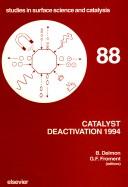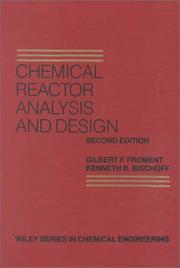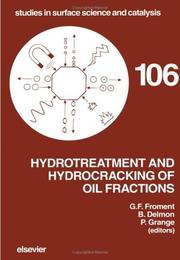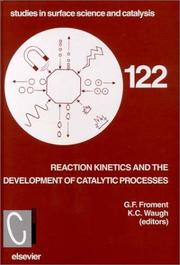| Listing 1 - 10 of 37 | << page >> |
Sort by
|
Book
Publisher: Loc. var. : nom. var.,
Abstract | Keywords | Export | Availability | Bookmark
 Loading...
Loading...Choose an application
- Reference Manager
- EndNote
- RefWorks (Direct export to RefWorks)
Book
Year: 1978 Publisher: Gent : RUG,
Abstract | Keywords | Export | Availability | Bookmark
 Loading...
Loading...Choose an application
- Reference Manager
- EndNote
- RefWorks (Direct export to RefWorks)
Periodical
Year: 1985 Publisher: Antwerp Koninklijke Vlaamse Ingenieursvereniging
Abstract | Keywords | Export | Availability | Bookmark
 Loading...
Loading...Choose an application
- Reference Manager
- EndNote
- RefWorks (Direct export to RefWorks)
Book
Year: 1985 Publisher: Brussel : Diensten voor programmatie van het wetenschapsbeleid,
Abstract | Keywords | Export | Availability | Bookmark
 Loading...
Loading...Choose an application
- Reference Manager
- EndNote
- RefWorks (Direct export to RefWorks)

ISBN: 9780444502131 0444502130 Year: 1999 Publisher: Oxford Elsevier
Abstract | Keywords | Export | Availability | Bookmark
 Loading...
Loading...Choose an application
- Reference Manager
- EndNote
- RefWorks (Direct export to RefWorks)
Studies in catalyst deactivation play a major role in the identification of the real catalytic system, in particular, the structure and texture of the solid, which is often in a metastable state, as it is operated in the industrial reactor. These studies also allow the identification of the experimental conditions which preserve this active and selective state. This is crucial for a real understanding of catalysts and catalysis. Another area of catalytic science concerns reactions kinetics, which, if properly determined, are of paramount importance in the elucidation of mechanisms. The behavior of the kinetics during aging and deactivation and an accurate modeling of the evolution of activity and selectivity are essential information for the process performance. These are just two typical examples, but quite generally, the science of catalyst deactivation is going to be more oriented to fundamental issues.

ISBN: 9780444816825 0444816828 9780080887388 0080887384 Year: 1994 Publisher: New York Elsevier
Abstract | Keywords | Export | Availability | Bookmark
 Loading...
Loading...Choose an application
- Reference Manager
- EndNote
- RefWorks (Direct export to RefWorks)
Catalyst Deactivation 1994 was an expansion of earlier, highly successful symposia. The objective of the symposium was to promote a scientific approach of the phenomenon of catalyst deactivation which will contribute to the development of catalysts which are less subject to structural transformations and more resistant to poisons and coke formation. These aspects are dealt with in 12 plenary lectures, 48 oral presentations and 35 poster papers, which were critically selected from an impressive response from some 30 countries. Both fundamental and applied aspects were covered. The deactivation of catalysts in important industrial processes like fluid bed catalytic cracking hydrotreatment, hydrodesulfurization, catalytic reforming, hydrodenitrogenation, steam reforming, hydrodemetallization, hydrocracking, Fischer-Tropsch synthesis, propane dehydrogenation, phthalic anhydride synthesis received considerable attention. Mechanisms of poisoning, sintering and coking were further investigated and modelled and new experimental techniques for the characterization and the quantification of deactivation were also introduced.

ISBN: 0471510440 9780471510444 Year: 1990 Publisher: New York, N.Y. John Wiley & Sons
Abstract | Keywords | Export | Availability | Bookmark
 Loading...
Loading...Choose an application
- Reference Manager
- EndNote
- RefWorks (Direct export to RefWorks)
reacties (chemische technologie) --- reactoren (chemische technologie) --- Chemical technology --- plug flow reactoren --- Chemical reactors --- Chemical reactions --- Chemical engineering --- Chemical reactors. --- Chemical reactions. --- Chemical engineering. --- Réacteurs chimiques --- Réactions chimiques --- Génie chimique --- Réacteurs chimiques. --- Réactions chimiques. --- Génie chimique. --- Réacteurs chimiques. --- Réactions chimiques. --- Génie chimique.

ISBN: 0471024473 Year: 1979 Publisher: New York (N.Y.): Wiley
Abstract | Keywords | Export | Availability | Bookmark
 Loading...
Loading...Choose an application
- Reference Manager
- EndNote
- RefWorks (Direct export to RefWorks)
Chemical reactors --- Chemical reactions --- Chemical engineering --- Réacteurs chimiques --- Réactions chimiques --- Génie chimique --- reactoren --- fluïdisatie --- model --- berekeningen --- overzicht --- kinetica --- katalysatoren --- massa --- overdracht --- diffusie --- principe --- absorptie --- pakking --- kolommen --- 66.0 --- Reactors, Chemical --- Chemistry, Technical --- Reactions, Chemical --- Chemical processes --- Chemistry, Industrial --- Engineering, Chemical --- Industrial chemistry --- Engineering --- Metallurgy --- Chemical engineering. Chemical production, processing, operations, plant --- Chemical engineering. --- Chemical reactions. --- Chemical reactors. --- 66.0 Chemical engineering. Chemical production, processing, operations, plant --- Réacteurs chimiques --- Réactions chimiques --- Génie chimique

ISBN: 0444825568 9786611034252 1281034258 008053435X 9780444825568 9780080534350 Year: 1997 Volume: 106 Publisher: Amsterdam New York Elsevier
Abstract | Keywords | Export | Availability | Bookmark
 Loading...
Loading...Choose an application
- Reference Manager
- EndNote
- RefWorks (Direct export to RefWorks)
The symposium on Hydrotreatment and Hydrocracking of Oil Fractions aims to provide a global perspective and an inspection of the state-of-the-art of these processes. New American, European and Japanese environmental regulations call for advanced hydrotreatment processes for HDS and HDN for the removal of S- and Ni-components from oil fractions. These will alter the product slate of the oil refineries and the hydrocarbon composition of these products. Hydrocracking will play an important part in this shift. Adapting the operating conditions will not suffice to reach the desired product specif
Catalytic cracking --- Hydrotreating catalysts --- Congresses --- Catalysts --- Cracking process --- Catalytic cracking - Congresses --- Hydrotreating catalysts - Congresses

ISBN: 0444500731 9786611071028 1281071021 0080540279 9780444500731 9780080540276 Year: 1999 Publisher: Amsterdam ; New York : Elsevier,
Abstract | Keywords | Export | Availability | Bookmark
 Loading...
Loading...Choose an application
- Reference Manager
- EndNote
- RefWorks (Direct export to RefWorks)
The symposium ""Reaction Kinetics and the Development of Catalytic Processes"" is the continuation of the very successful International Symposium ""Dynamics of Surfaces and Reaction Kinetics in Heterogeneous Catalysis"", held in September 1997 in Antwerp, Belgium. These proceedings contain a unique series of top level plenary lectures mainly focused on the dynamics of catalytic surfaces the interaction of the reacting molecules with the solid catalyst the elementary steps of reaction pathways and molecular kinetics. Surface science techniques, molecular modeling, transient kineti
Catalysis --- Chemical kinetics --- Congresses.
| Listing 1 - 10 of 37 | << page >> |
Sort by
|

 Search
Search Feedback
Feedback About UniCat
About UniCat  Help
Help News
News